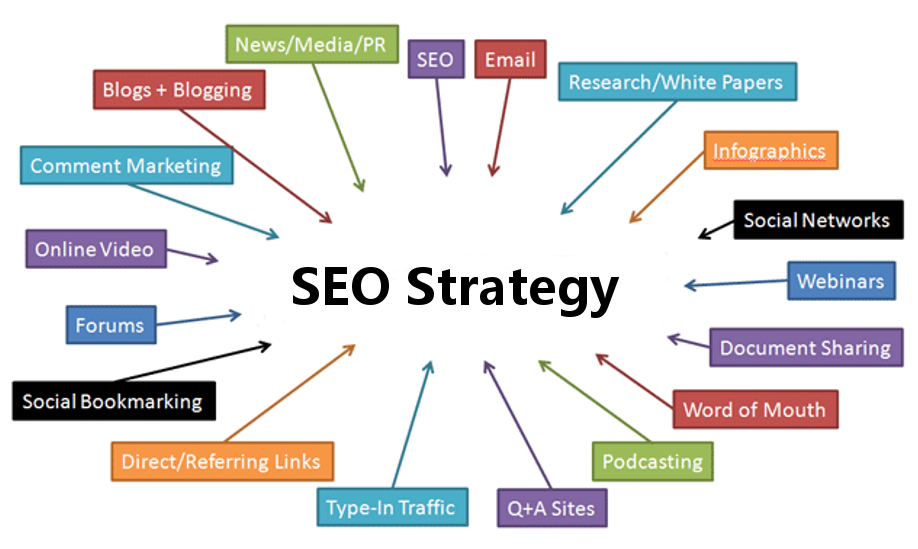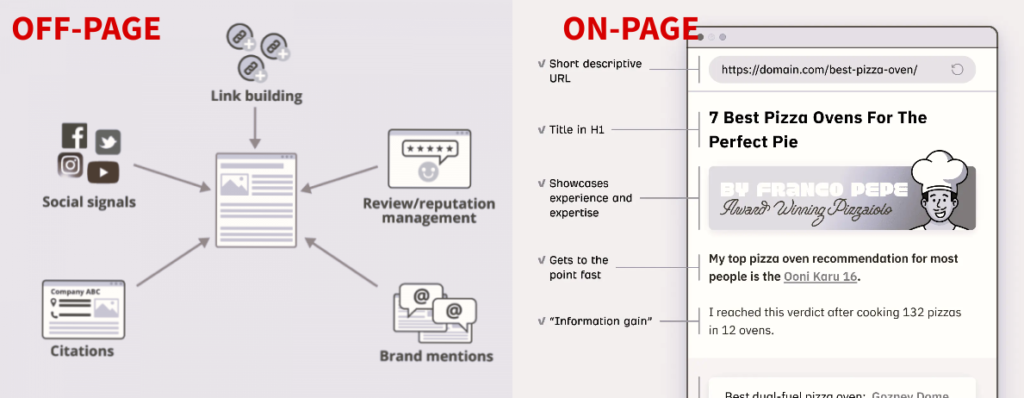SEO stands for Search Engine Optimization and is a set of activities aimed at increasing a site’s rating in a search engine such as Google. More people visit the site, when its rank is higher. The fundamental concept of Search engine optimization is, therefore, aimed at increasing traffic to a particular Web site with the help of enhancing people’s visibility of the site when presenting specific keywords.
Important: SEO expert means someone who masters in SEO learning, SEO practice, and updated with the changes in SEO algorithms.

Types of Search engine optimization:
On-Page Seo:
ON page SEO refers to those aspects of a website which can be changed by the owner of the site. For Eg: adding keywords into the title tags, using keyword-linked images, creating relevant meta descriptions, and using relevant keywords in content can all help improve your search rankings through ON page SEO.
| On page SEO requirements | Short explanation |
|---|---|
| Target keywords | Perform keyword research to find what words and phrases people use to find pages like yours |
| URL optimization | the practice of optimizing your URLs according to search engine optimization best practices |
| Title Tags | A title tag is an HTML element that specifies the title of a web page |
| Header tags | HTML header tags are used to differentiate the headings (h1) and sub-headings (h2-h6) of a page from the rest of the content |
| Meta Description | A meta description tag generally informs and interests users with a short, relevant summary of what a particular page is about |
| Internal Linking | An internal link is any link from one page on your website to another page on your website |
| 404 Error Pages | A 404 page, or error page, is the content a user sees when they try to reach a non-existent page on our website |
| 301 Redirection | A 301 signals a permanent redirect from one URL to another |
| No-Follow And Do-Follow | Dofollow links pass on PageRank , encouraging Google to crawl and index the link. Nofollow links typically not followed for crawling and indexing purposes |
| Creating XML Sitemap | A file that lists a website’s essential pages, making sure Google can find and crawl them all |
| Robot.txt | file tells search engine crawlers which URLs the crawler can access on your site |
Off-Page Seo:
Off page SEO refers to those aspects of a website outside the owner’s control that SE(search engine) take into account when calculating rankings such as backlinks, social sharing, and external citations. For example, if you have a website with pages about your local community and another site reports on your community, that article might be cited by the search engine. In this case, the article is considered an external citation and will help your search rankings.
| Off page SEO requirements | Short explanation |
|---|---|
| Link Building Tips & Techniques | Links are one of the primary ways that search engine algorithms determine the relevance of a page. Having a good number of links to a website indicates that the content is there is valuable |
| Difference Between White Hat And Black Hat SEO | While white hat SEO involves looking for ways to improve user experience, black hat SEO relies on manipulating Google’s algorithm to improve rankings |
| Social Bookmarking Submission | if there’s a blog post that is about YouTube SEO strategies, you can “tag” that content as “YouTube. |
| Search Engine Submission | when you submit your website to search engines to be indexed and listed in the search results |
| Web 2.0 Submission | the process of creating and publishing content on Web 2.0 platforms to enhance online visibility and improve search engine rankings |
| guest posting | Guest posting, also called guest blogging, just means writing and publishing an article on someone else’s website |

How to improve your site’s ranking with both ON and OFF page SEO:
- Many small business owners don’t have the time, skills, or expertise necessary to handle Seo for their site.
- In practice, this expands the role of SEO; it’s not enough to simply weave in popular keywords and deliver high-quality content.
- keyword research to content evaluation, from page optimization to internal linking, it’s easy for companies to end up with a generic web presence that doesn’t inspire engagement or drive conversions.
- Designing an effective SEO strategy isn’t a simple task. Companies have to consider how search engines are evaluating the content, what aspects of SEO offer the most impact, and where they could change their current content to better align with search engine expectations. This is especially critical as search engines like Google continually refine their ranking process and algorithms.
- For example, page loading speed is now a factor in search result rankings. Brands also need to consider the entire user experience. As a result, it’s often worth outsourcing SEO services to ensure that your digital presence is generating maximum impact and capturing the highest volume of prospective customers
